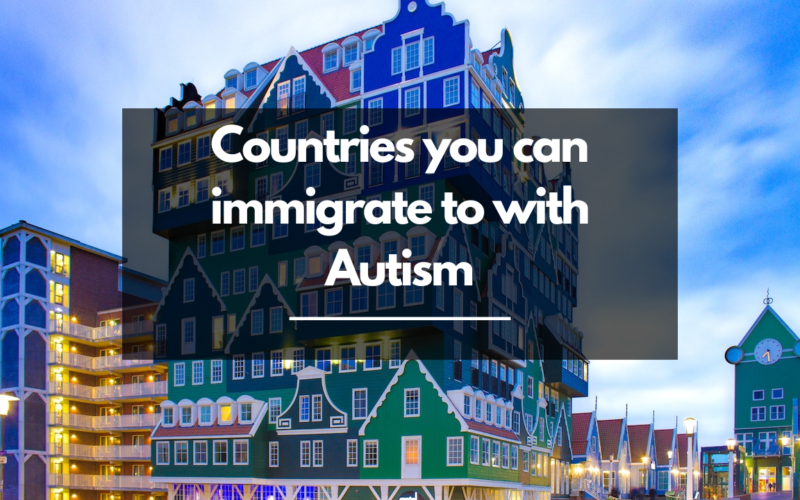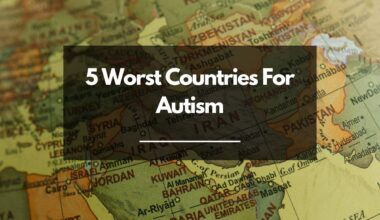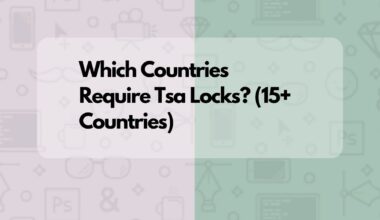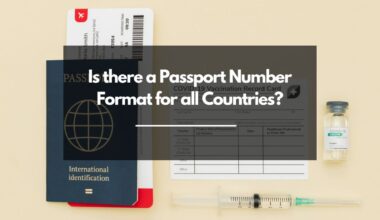As an Amazon Associate, I earn a small commission from qualifying purchases. Learn more about this.
Autism is a neurodevelopmental disorder that influences a person’s social interactions, communication, interests, and behavior.
Approximately 1 in 54 children are diagnosed with autism, according to the CDC. However, its prevalence may be underestimated due to a lack of awareness and diagnostic facilities in many parts of the world.
Living with autism is unique to each individual, and when considering immigration, the laws and resources available in the host country can play a critical role in the quality of life. This article will cover some of the countries that are welcoming to immigrants with autism and have established systems of support.
6 Countries you can immigrate to with autism
While the world can sometimes feel like a challenging place for people with autism and some countries end up rejecting them, there are still plenty of welcoming destinations globally. Below is our list:
1. Sweden

Sweden is known for its social welfare programs and having a well-established healthcare system.
The Swedish Autism and Asperger Society offers comprehensive services for individuals with autism, including counseling, vocational training, and leisure activities. Moreover, the Swedish Education Act ensures that all children, including those with disabilities, have access to equal education.
ALSO READ: 5 Worst countries to live with Autism
While there are health requirements for immigrants, they are not strictly tied to eligibility for a visa. Each case is evaluated on an individual basis.
So we could assume, there’s a higher chance of immigrating here with autism.
2. Canada
Canada’s Immigration and Refugee Protection Act allow individuals with autism to immigrate, although there can be medical admissibility considerations. This was an update in 2019, before which they officially decline autistic people in general.

Also, Canada’s National Autism Spectrum Disorder Surveillance System (NASS) promotes the sharing of knowledge and best practices.
Moreover, Canada’s public health care system offers services for those with autism, although availability can vary by province.
3. United Kingdom
The UK is known for its robust social care system and inclusivity. Various non-profit organizations and government programs are in place to support people with autism.
The National Autistic Society, for instance, provides resources, support services, and advocates for change, making it one of the best places to live with autism.
Regarding immigration, while there is a ‘good health’ requirement, it is not as stringent as it might appear. Each application is considered on its merits and compassionate grounds are often taken into account. Hence, cases vary.
4. Germany

Germany, with its rich history and high-quality life standards, is another country worth considering. Germany’s healthcare system is renowned worldwide, with specialized services and support for individuals with ASD.
The education system also caters to the needs of students with autism, providing tailored programs to ensure their success.
Additionally, Germany has been working diligently to foster a more inclusive society, with a range of social initiatives aimed at promoting equality. As for immigration, Germany has policies that are generally welcoming, with no specific restrictions for individuals with autism.
Here’s a Reddit post that confirms this.
5. The Netherlands
The Netherlands, with its picturesque canals and progressive social policies, is another destination to consider.
The country has a robust healthcare system that provides comprehensive support for individuals with ASD. Dutch schools are inclusive, with many having special education programs to cater to students with autism.

Moreover, the Netherlands has a welcoming immigration policy.
6. United States
Last but not least, let’s take a look at the United States.
In the United States, individuals with autism can access a wealth of resources and support. Legislation like the Americans with Disabilities Act (ADA) and the Individuals with Disabilities Education Act (IDEA) safeguards the rights of those with autism.
In terms of support services, there are numerous organizations available, including the Autism Society of America and Autism Speaks.
And for immigration, while the US generally have strict immigration policies, their stand regarding immigrating autistic people is not specific or direct.
Why are Some Countries Hesitant Regarding their Immigration Policy for Autistic people?
Now, you might be asking, “Why aren’t all countries welcoming to people with autism?”
Well, to begin with…
In many parts of the world, immigration policies are designed with a certain mindset – they want to attract individuals who can contribute economically. Sometimes, unfortunately, they view autism through a lens of limitation rather than recognizing the diverse strengths and unique abilities that individuals on the spectrum bring to the table.
On the other hand, some countries might feel overwhelmed by the potential need for additional support services. It’s not that they don’t want to help; it’s that they may already be struggling to adequately provide for their existing population.
The thought of adding more people to the mix, especially individuals who might need more assistance or specific services, can seem daunting.
There’s also the fact that understanding and acceptance of autism can vary widely between countries.
While some have made great strides in terms of awareness and inclusivity, others are still coming to grips with understanding neurodiversity and different abilities. In these places, societal attitudes and a lack of understanding can impact immigration policies.
Wrapping up
More and more countries are recognizing the value of all individuals every day, regardless of their neurological makeup. While some countries may still be hesitant, the trend is moving towards greater inclusivity and acceptance. Let’s keep our fingers crossed and hope for a future where every country recognizes the strengths and potential that autistic individuals bring with them, wherever they choose to call home!







